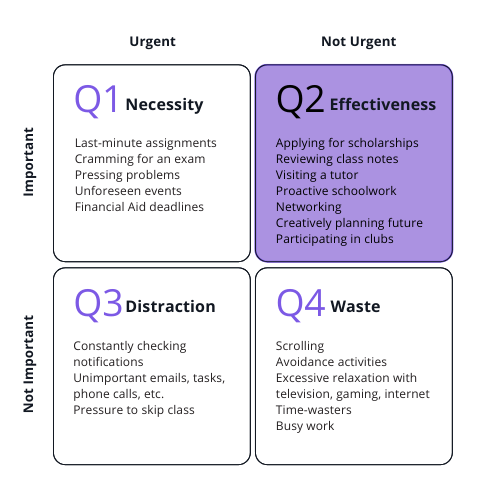Helping Students Focus
Students often think that managing their time is about managing the clock. They concern themselves with deadlines and due dates when they really should be concerning themselves with their compass. Their personal mission should be their true north. Every decision they make about how to spend their time should be oriented toward what’s most important to them. This is the best way to avoid burn out, procrastination cycles, and even dropping out.
Habit 3 is the day in, day out, moment-by-moment work that takes students to their ultimate vision. It’s about protecting time for what’s most important to them.
The Time Matrix®
One of the tools we give students to help them manage their time and decide what’s most important is the Time Matrix. As they fill it with the many aspects of their lives that require their time, they consider:
Urgency: How soon something must be done—or seems it must be done.
Importance: Whether something contributes to their mission, roles, values, and goals.
Students thrive the most when they spend their time on things which aren’t urgent but are important. For example, studying, planning, or renewal activities. (Q2)
It’s easy for top priorities to get crowded out by things that feel urgent but aren’t very important—or by things that waste their time and potential. The Time Matrix helps students realize what things should truly come first to help achieve the future they want.


Putting first things first means organizing and executing around your most important priorities. It is living and being driven by the principles you value most, not by the agendas and forces surrounding you.
Free Tool
Help students find direction and purpose with this free online tool.
Free Guide
See how institutions are improving retention and student success by teaching students the 7 Habits.
Focus and act on what you can control and influence instead of what you can’t.
Define clear measures of success and a plan to achieve them.
Prioritize and achieve your most important goals instead of constantly reacting to urgencies.
Collaborate more effectively by building high-trust relationships.
Influence others by developing a deep understanding of their needs and perspectives.
Develop innovative solutions that leverage different perspectives and satisfy all key stakeholders.
Increase motivation, energy, and work/life balance by making time for renewing activities.
See how the 7 Habits can easily integrate into your programs and change the lives of your students.









